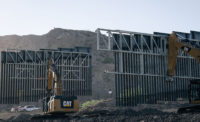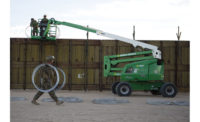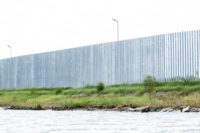The U.S. Army Corps of Engineers did not respond to the U.S. Dept. of Homeland Security’s request for information on how to make the federal border wall more impenetrable and to incorporate privately built and financed barrier sections.
Comments to the Customs and Border Patrol unit of DHS were due June 12.
Agency officials did not respond to an ENR request for details on the number, scope and usefulness of responses received on wall design and construction changes or on planned private development of 30 wall segments totaling about 250 miles.
A Corps spokeswoman did confirm that the agency did not respond to the DHS request for information issued last month and is not involved in land acquisition or project delivery that includes private walls.
As of mid-May, contractors have built or reinforced about 194 of the 450 miles of wall, including 16 miles of new wall, that President Donald Trump wants completed by December through billions in contracts awarded by the Corps.
DHS told potential RFI respondents that the agency is not obligated to notify respondents of results of the RFI aimed to “improve mission essential operational deterrent capabilities related to the anti-climb/anti-cut features of the border wall.”
Based on prototypes analyzed in 2017, DHS had adopted a 30-ft-high steel bollard wall design. But the Washington Post and other media have reported breaches of the new wall by border crossers. The Post noted 18 breaches in the San Diego area in one month last fall, based on a Freedom of Information Act query.
DHS seeks “innovative wall designs that have capacity to leapfrog current technology … and provide early warning on climbing or breaching attempts,” says its RFI. It also wants “sustainable design solutions” to boost wall durability in rugged terrain, high heat and wildfire conditions. Submissions had to state predicted life cycle of any suggested wall designs and “rough order of magnitude cost” in fiscal 2020 dollars.
The query also sought input from private entities and nongovernmental organizations that DHS said “also have an interest in supporting the mission of border protection by deploying private wall solutions.”
The only private developer so far to build private wall sections is We Build the Wall, an advocacy group that says it has raised $25 million for construction and has hired contractor Fisher Sand & Gravel to build a one-mile section in Sunland Park, N.M., and a 3.5-mile, $40-million segment in Mission, Texas.
Fisher, believed to have self-funded some segment land purchases, also is among the group of preselected Corps border wall contractors and has won two federal wall contracts in Arizona totaling about $1.7 billion.
In a tweet, We Build the Wall takes credit for the decision to issue the RFI, claiming private wall construction is quicker and cheaper. The group did not confirm to ENR if it sent an RFI submission.
Its website says the group is ready “to build another 100 miles” of wall and “is working with local, state and federal governments, as well as private landowners, to close the borders.”





